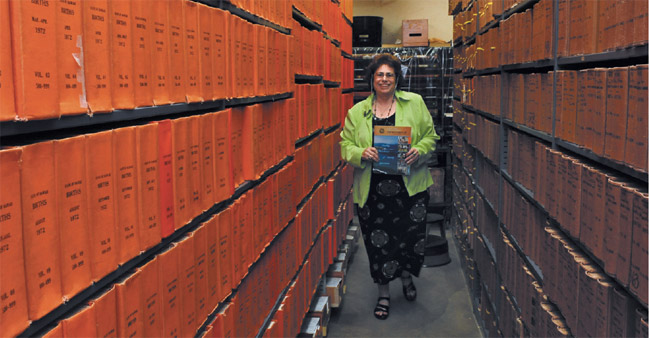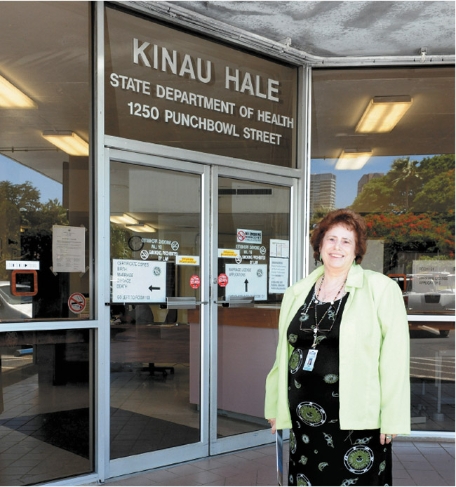Promoting A Healthier Hawaii
Loretta Fuddy, director of the state Department of Health, works to improve the health and environment of the people of Hawaii
When Loretta Fuddy toasts to your good health, she means it more earnestly than anyone else in the state. Her accountability as a public official depends on it.
Fuddy, 65, is the director of the state Department of Health, an agency of 3,000 employees who administer the mission, policies and outcomes of our public health system. It seems inconceivable that government is entrusted with something as ethereal and personal as one’s health. Yet, it is central to the well-being of a society.
nm_loretta-fuddy_2
Put on that platform, it is worth a closer look at the government official who holds the reins and responsibilities for health policies in Hawaii. As access and affordability of health care become major issues in our lives, we want to ensure that our ranking public health official is purposefully directed.
The direction to public service started early in Fuddy’s life, as she was raised in Kaimuki and educated at Sacred Hearts Academy. Her parochial upbringing taught her to be an industrious, motivated and purpose-driven citizen.
“I’m a child of the ’60s, the Kennedy era of ‘ask what you can do for your country’ public service and Catholic values,” says Fuddy, known to her friends as “Deliana.”
“Once I started working in sociology, helping local families, children and special-needs individuals, the roots of public health were planted.”
Fuddy embellished her passion with degrees in social work and public health from the University of Hawaii. She also did doctoral studies at Johns Hopkins University. She served as deputy director of the state Department of Health from 2001 to 2002. She was appointed director in March 2011, culminating 38 years of experience in the fields of health and human services.
While her job affects many lives, the average citizen usually has only a cursory connection with her office. For many, life begins there.
The state Department of Health at 1250 Punchbowl St. in downtown Honolulu is where vital records, such as birth certificates and marriage licenses, are filed.
We officially become a state statistic when we pass through its portals – just ask Barack Obama. You can’t prove that you exist without paperwork from DOH.
But the mission of the department goes beyond that.
“The scope of the Department of Health is very large,” Fuddy says. “Our mission is to preserve and protect the health and environment of the people of Hawaii.
“Health is all-encompassing. It’s not just physical health. It’s the alignment of social, mental and spiritual well-being – body, mind, spirit – that allows citizens to be actively engaged in the community.”
It’s a perspective that doesn’t come from a trite mission statement.
Fuddy, you see, is the first social worker to be tapped for the director of health role. Past directors tended to have medical or public heath backgrounds. Her background and passion come from a premise that social determinants – conditions in which people are born, grow, live, work and age – drive sustainability. When Fuddy and her colleagues look at health policies and standards in our state, they screen them through a lens of social, environmental and behavioral impacts.
This has been the department’s mandate from the start. It’s not unique to her administration, but the complexity and dynamics of the health-delivery system never have been more robust. The players – citizens, medical practitioners, insurers and policy-makers – are engaged in a chess game of systemic survival as never before.
As health costs climb higher, we face the realities of an aging population and prevailing chronic health conditions such as cancer, diabetes and heart disease. Suddenly health care reform is the big elephant in the room. Hawaii’s health care costs exceed $8.8 billion, or more than 13 percent of the state’s economy in 2009. Nationally, health care accounts for about 18 cents of every dollar Americans spend.
According to Fuddy, the United States spends more on health care than any other country, mostly to treat preventable and non-communicable chronic diseases such as heart disease and obesity. Despite the enormous expenditure, we continue to see unprecedented rates of chronic diseases in children and adults. For the first time in more than 200 years, today’s children may expect a shorter life span than their parents, she claims.
Whatever it’s called – health care reform, Obamacare, universal health care, survival of the fittest – we all are affected by the catalysts of change.
This is happening while traditional medicine makes a paradigm shift from treating diseases to a focus on wellness and preventative health care.
Does the state have a plan?
We put the question to Fuddy, asking her to describe a health utopia. With the fervor of Martin Luther King Jr., she “has a dream,” and a plan.
“We have five foundations for healthy generations,” she says, outlining the department’s vision and goals.
In Fuddy’s utopia, there is health equity that addresses disparities among ethnic groups and economic classes; disease prevention for quality health and wellness promotion; emergency preparedness that responds to natural and man-made threats; clean and sustainable social and physical environments; and service excellence for quality and timely responsiveness.
These also are the platforms of the department’s strategic plan and bases for national public health accreditation.
It couldn’t be more timely, as the federal government mandates communities to do current health assessments as part of its Affordable Care Act. It serves as a baseline for measuring the progress and impact of new universal health care legislation.
The 2013 Hawaii Hospitals Community Health Needs Assessment (CHNA) identifies top community health needs by county and across the state. The CHNA process represents a new partnership for Hawaii hospitals and the state Department of Health, according to Fuddy.
“It’s encouraging to see the alignment of priorities between Hawaii hospitals and public health based on the new health data,” Fuddy says. “This first statewide assessment is a great start in identifying areas where we can engage and create partnerships among hospitals, communities, the DOH and our business sector to work toward better health for all Hawaii.”
The assessment will be conducted every three years, and Hawaii is one of only two states engaged in a statewide survey with its hospitals. The Healthcare Association of Hawaii leads the data-driven collaboration.
CHNA results, released to the public July 3, identify community health centers and schools as key assets for public health education and interventions. Topline findings list mental health, heart failure and bacterial pneumonia among the top causes for hospitalization in 2011. The full report is available online at HAH.org.
The picture of health in Hawaii is obviously a multifaceted one. Even while living in an idyllic “paradise,” responsibility for following a healthy lifestyle and making the right choices for survival remain an individual matter. Accessibility and affordability for making those choices are driven by public health policies and decision-makers like Fuddy, a cancer survivor who speaks from personal and professional experience. She encourages citizens to ask questions, get answers and cure the ignorance that plagues health care reform.
Do it for the health of it.
Or, as Mae West put it, “You only live once, but if you do it right, once is enough.”







